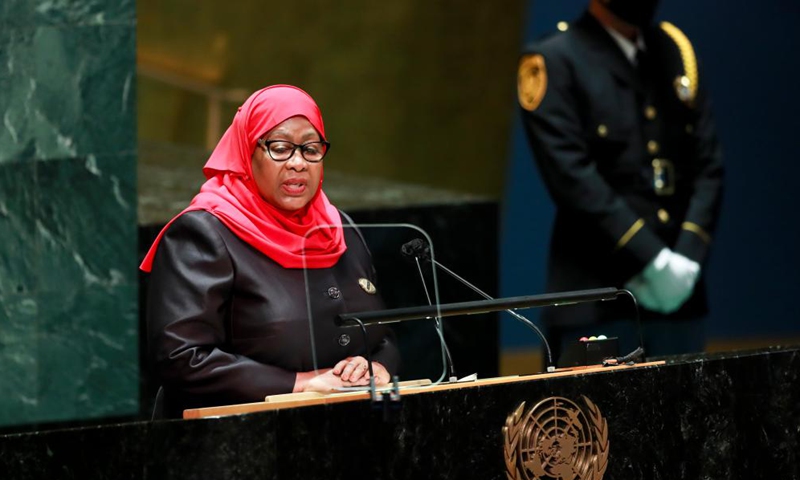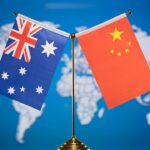At the invitation of Chinese President Xi Jinping, Samia Suluhu Hassan, president of the United Republic of Tanzania, will pay a state visit to China from November 2 to November 4, the Chinese Foreign Ministry announced on Thursday.
Tanzanian President Hassan will be the first head of state from Africa to visit China after the conclusion of the 20th National Congress of the Communist Party of China, and President Xi will hold a welcome ceremony for Hassan, hold bilateral talks and jointly attend a signing ceremony of cooperation documents, Mao Ning, spokesperson of the Chinese Foreign Ministry, told a routine press conference on Thursday.
Tanzania is an important country in East Africa. China and Tanzania enjoy traditional friendship, Mao said.
“In 2013, during his visit to Tanzania, President Xi put forth the guiding principles of China’s policy toward Africa, namely sincerity, real results, affinity and good faith, which have then become China’s basic policy on pursuing solidarity and cooperation with other developing countries. In recent years, the two countries have witnessed deepening political mutual trust and fruitful practical cooperation and have maintained sound cooperation in international and regional affairs,” the spokesperson said.
The visit of the African head of state was announced as China welcomes other foreign leaders, including Vietnam’s Communist Party chief and the Pakistani prime minister following the conclusion of the 20th CPC National Congress. Mao also noted that Hassan’s visit to China will inject new impetus into the comprehensive and profound development of China-Tanzania relations and make new progress in bilateral friendship and cooperation, Mao said.
Some Chinese experts believed that the upcoming visit will be of great significance to accelerating bilateral ties, opening a new chapter for China-Africa relations in the post-COVID period.
Tanzania, as an old friend of China, is interested in learning about China’s model of development, especially after China’s economic reform and opening-up. Besides some traditional areas such as agriculture, in which the two countries have already deepened their cooperation, the two sides are expected to see more growth potential in sectors such as key infrastructure projects, industrialization, supply chain, import and export of agricultural products as well as agricultural processing, some experts said.
China and Tanzania have been seeing their trade and business exchanges growing over the past decades. For example, we have set up some agricultural demonstration centers in the country, investing in many sectors such as cotton and leather, Tang Xiaoyang, professor of the department of international relations at Tsinghua University, told the Global Times on Thursday.
Most recently, the Chinese Embassy in Tanzania held an online training course on Juncao technology from October 11 to 24. Commercial Counselor Chu Kun said at the closing ceremony of the course that China is willing to continue providing assistance to help Juncao technology benefit Tanzanians, according to the embassy’s official account on Twitter.
Juncao, which literally means “mushroom” and “grass,” can be used, as its name suggests, to grow edible mushrooms, as livestock feed or as a green barrier to combat desertification.
China’s Juncao technology has been introduced to 106 countries and regions, helping address poverty in many places including South Pacific countries, Africa, and Latin America, Lin Zhanxi, a delegate to the 20th National Congress of the CPC and inventor of Juncao technology, said on October 16.
“As Tanzania has also been heavily hit by the COVID-19 epidemic, and its overall industrialization remaining at a relatively low level, there will be much more potential for the two countries to cooperate in those areas, for example, in helping to boost the agricultural supply chain, processing of agricultural products and increasing some imports to China,” Tang said.
On major infrastructure projects, Tanzanian news outlet The Citizen recently reported that the Tanzania is set to start construction of Bagamoyo Port in the next financial year, a key infrastructure project that was set to include a special economic zone and attract hundreds of companies. Some media reports also predicted that when completed, the port is expected to be the largest in East Africa.
“Negotiations on the port project could be resumed, which could play a more significant role in the future,” Tang said. As negotiations on the project between China and the African country were halted due to certain reasons, the upcoming talks are expected to be advanced in a cautious and gradual way, the expert noted.
(Global Times)




